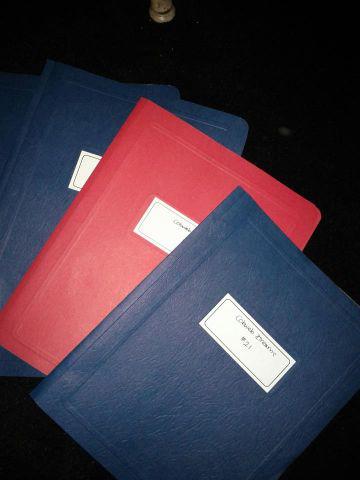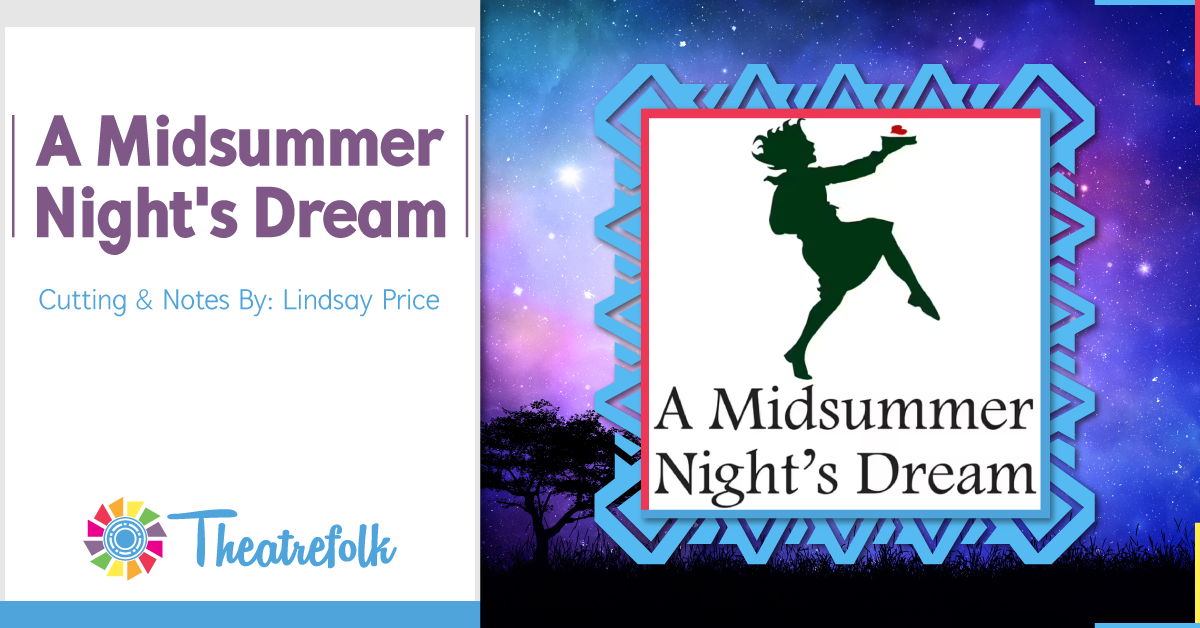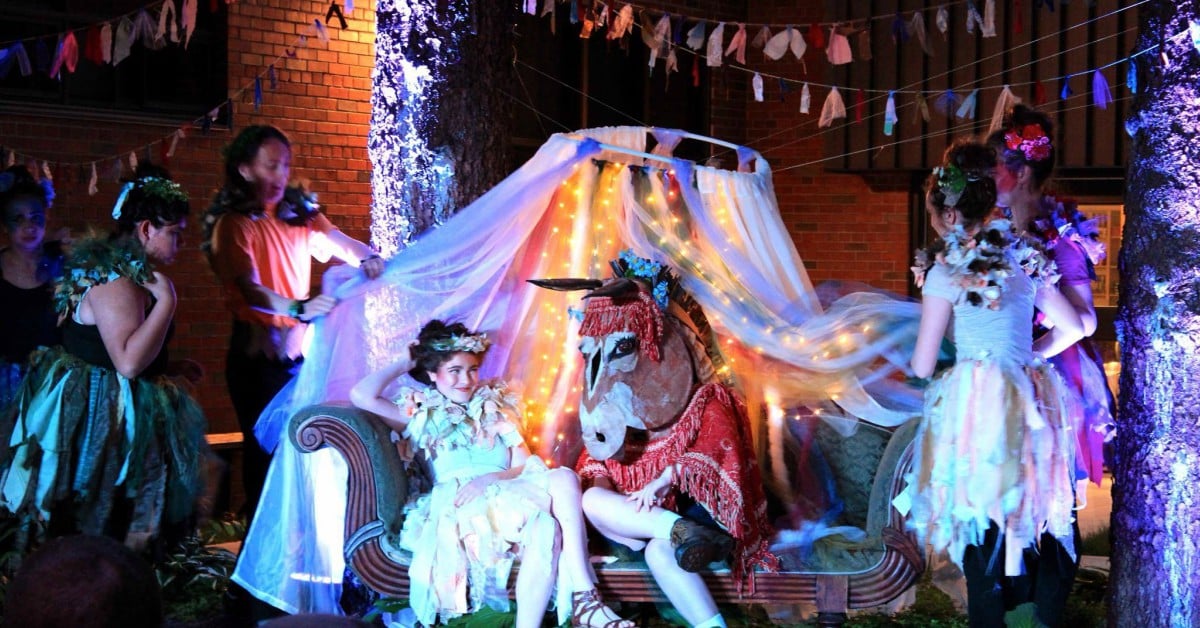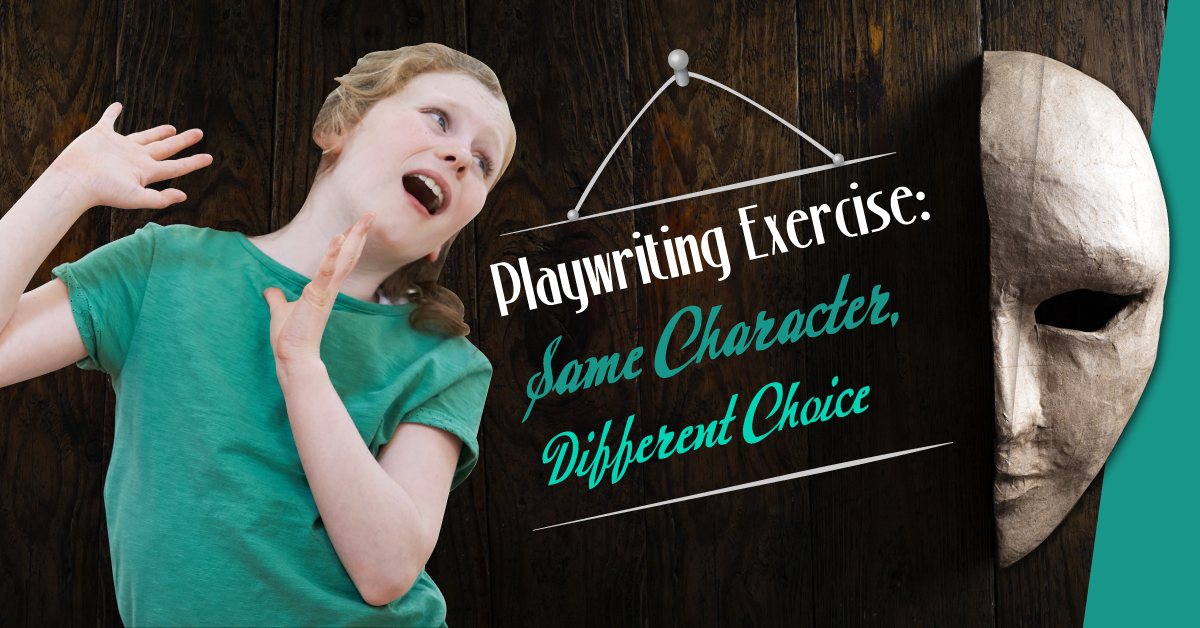Teacher Interview
Episode 13: Teacher Interview
Lindsay sits down with teacher and director Ina Szekely moments after finishing a new play workshop at Havergal College. Ina will be directing the premiere of Lindsay’s play Cobweb Dreams in the spring. They talk process and what it’s like to direct a premiere as her first play.
Show Notes
- FATE (The Florida Association of Theatre Educators)
- CODE – Council of Ontario Drama and Dance Educators
- ABCDE – Association of British Columbia Drama Educators
- Our Conference Schedule (on the right-hand side of the page)
- Havergal College
- A Midsummer Night’s Dream
Subscribe to The Theatrefolk Podcast in iTunes by CLICKING HERE.
Episode Transcript
Lindsay: Welcome TFP The Theatrefolk Podcast. I am Lindsay Price, resident playwright for Theatrefolk. Hello. I hope you’re well. Thanks for listening. Today I get to talk to a teacher who is going to direct the upcoming premiere of one of my plays. But first, let’s do some Theatrefolk news. Craig and I are in the thick of conference season. It’s always busy in the fall. It’s an important part of having a company like Theatrefolk, to go and meet face-to-face with our customers and with people who we would like to be our customers. It’s important to us that people see us as humans. See those two people behind that table? They’re the ones the write some of the plays, and work on the web site, and write the blog posts, and do the newsletters, record the podcasts, answer the phones, respond to your emails. We are Theatrefolk, and we want people to know that we do all those above things because we care about being Theatrefolk So, last weekend we were at the Florida Association of Theater Educators conference, a longstanding teacher conference for us. It’s one we have a great fondness for because Florida really was the first place where teachers connected to us as a company and as people. The first place that saw us as human beings. For a long time I would travel to Florida to do workshops and premiere plays, because that was the only area that was interested in having anything to do with me. Although, I can’t say that I ever really complained about going to Florida in December or in February, just saying.
Then, upcoming, this weekend, Craig and I are split in two. I head to the Code conference, Council of Ontario Drama and Dance Educators conference, which is on our home turf, yo. Oh, goodness. Anyway, that’s always nice to be able to meet teachers who live and who work near us. And for the first time, Craig is going to the ABCDE conference, in British Columbia. Very excited about that one, as we connect to BC teachers a lot online, but this will be the first time in person. And as much as I love our online presence, sometimes, you need to things face-to-face. Lastly, where oh, where can you find this podcast? We post new episodes every Wednesday at Theatrefolk.com, and on our Facebook page, and Twitter, and you can subscribe to TFP on iTunes. All you have to do is search on the word Theatrefolk. Oh, this is the first in what I hop is many, many, many interviews with teachers. Schools and student performers, that’s what we do, that’s what we focus on. And I really want it to be an ongoing thing, where we talk to those who are in works and directing our works, and having those kinds of discussions.
So this first one, I had the opportunity to sit down with the upcoming director of a new play of mine, Cob Web Dreams, which is an adaption of sorts of A Midsummer Night’s Dream. It focuses on one of the minor fairies, Cob Web, and it’s going to premiere at an all girl’s school, Havergal College in Toronto in May of 2013. And I went into the school at the end of September to do a introductory workshop of sorts with the students, and this chat takes place right after the third day, so as you’ll see, both the teacher and I were a little spacey. I’m sure you’ll forgive us. Okay. So we’ll just sort of ease into this.
Ina: Okay.
Lindsay: Because my brain is like very…
Ina: Mine too. Fuzzy.
Lindsay: But you know what? That would be a good thing to talk about. So I am here at Havegal College, and I am with Ina, please tell me your last name.
Ina: Szekely.
Lindsay: Szekely. And we have just spent three days workshoping a new play, Cob Web Dreams, which Havergal is going to do in May. We’re just talking that our brains are a little bit in a funny place. Where are you right now?
Ina: Well, it’s really interesting to see it. The girls just read the first part of the first act.
Lindsay: And Ina is going to be the director.
Ina: Yes, I will be the director. It’s also the first time I’m directing a play.
Lindsay: Really?
Ina: So I’ve this happen a couple of times, and so it’s really exciting for me, and I also I am really concerned. My initial concern was there sort of weren’t enough girls and it was a really young cast, and now, because we have a lot of great sevens and not a lot of returning people from last year, maybe a handful, but I was really impressed with the work that they did. It really makes a big difference hearing the lines back and forth, and I was thinking a lot about the relationships between the characters.
Lindsay: So how did you get roped into this, this being your first time directing?
Ina: So Larry Taylor, who has been the long-time drama person here, he has been the director for Havergal Theater for years.
Lindsay: For years.
Ina: And decades.
Lindsay: And the reason that I’m here is that two years ago Larry did Agatha Rex and it was one of the best, not just middle school productions of the play, but it was one of the best productions I’ve ever seen of Agatha Rex.
Ina: That’s great.
Lindsay: Just seeing the whole team involved in the production, and just how crisp and very focused the acting was, I knew right away that, if Havergal was keen, I would have loved to have another play done. And that’s sort of how, two years later, that’s where we are now. And so?
Ina: So Larry is close to his retirement. He’s probably within a few years of his retirement, and I think he wants to sort of make sure that the Havergal Youth Theater, which is the middle school theater here, is in capable hands and in hands that he has had some kind of hands in developing. So we have been working closely together. Last year we worked very closely together on our production, and this year he is doing a lot of the producing, and he’s sort of also helping me up. So if I have questions or I’m not sure about what to do, he kind of gives me advice. I’m using a lot of his model, in terms of how to organize the girls, and what things to be aware of, in terms of middle school.
Lindsay: During the workshop he’s been really great at sort of keeping hands off. You’re obviously the director.
Ina: And he’s very good. He’s very, very good at biting his tongue, but I also know if I solicit his feedback he’ll give it to me.
Lindsay: So what’s your background?
Ina: My background is mostly in English and Social Science. I’ve been a teacher for 15 years. And I’ve worked alongside drama productions. I was in drama productions in high school. I’ve done a lot of musicals, and I perform. I’m a singer. So that’s kind of where the performance background comes in. But I also think because I’m a great lover of literature and I love reading plays, in particular, Shakespeare, I feel like I have a good instinct, especially for relationships between characters, and using body language and facial expressions to reveal your characters. So that’s one reason why this play appeals to me.
Lindsay: Well, one of the things that was really most impressive to me when we had our initial talk, was that you had a vision for the play. And the fact that what really spoke to you was this notion of Victorian England, and the power-struggle relationships, and I remember being on the phone going, ‘Well this is the best thing. This is awesome,’ that that is the thing that you were coming to the table with, that you have a vision. Is that something that Larry sort of said, ‘Hey, you know, this is the kind of thing,’ or where did that come from?
Ina: No. We started off thinking it was was going to be like a steampunk urban fairy. That was the first thing. And then I thought, the reason why I think we initially generated that idea is because it’s something that the kids could easily recognize. So we thought, ‘Oh, they understand punk. They have an urban setting.’ And then I thought, how are you going to bring in the obvious class structure, with the sort of fairies-in-waiting, and the woodland fairies at the bottom. It was almost like a Westside Story kind of division, and that’s when I started thinking bigger picture about, if it was something like Westside Story, where there’s a lot of fanfare and a very strong identification of groups, then I started thinking of Victorian England. But the other was, it actually came from the set. The original set piece that I had in mind when I was looking at the play, was this sort of huge maple-like tree, and that’s when I started thinking about moveable set pieces, and something that was a little bit more, almost like Victorian musical, where the pieces will move. Because she’s a trickster and because there’s a lot of play, and they’re a part of nature, just that there’s a lot things that are always happening, and the idea that the fairies are always around, even when you don’t see them. In the script I saw Cob Web hiding behind a bush, and I thought how funny if she was moving the bush back and forth as she’s hiding. Or Puck sort of jumping up and down off of a stone. And I just saw them really interacting with the set.
Lindsay: And how hard has it been? It sounds like having this very defined vision right from the get-go has been very influential, just in terms, with your production team and with your set. I think you would agree. You are nodding.
Ina: Yeah, definitely. It’s been very influential. And that’s why the exercises that you’ve done with them, that were working with class and status and movement, were so helpful for me. When you did that with them I thought, ‘No, this is the way.’ I was even more convinced of the vision.
Lindsay: It’s amazing how vision can influence everything. I’m always amazed when I see shows and I have no idea. Because I think that is the director’s job. The director’s job is the overseer, and one of the things that should oversee a production is the vision. I think that’s the most fun part of the director’s job, is to sort of give it, rightly or wrongly, to have some kind of concept. And to have a concept that can be relayed to your costume and your set, and just even telling your actors. So as soon as Ina told me about this Victorian England vision, which, frankly, I was just so focused, because Cob Web Dreams is an adaptation of A Midsummer’s Night Dream. So my focus for the writing was that it comes from the point of view of one of the characters, Cob Web, Cob Web Dreams, just following her story. My soul goal was to follow her journey and how she gets helped and hindered. Then you came along and said, ‘Yeah, I see power struggles in Victorian England.’ That just opened up a whole new avenue for me, as it should, as the first director should. And then it’s also the difference between a director who is trying to reclaim, and a director who is taking what’s on the page and being inspired by it. And I just love that notion of Victorian England, and that’s how I did the whole first day of the workshop.
Ina: And that was great. It was really good.
Lindsay: I think they got it, and I think get status. They get status, they get status everyday.
Ina: They’re middle-schoolers. It’s part of their existence.
Lindsay: Whether or not they get what Victorian England is, and it was so funny because when we were talking with the students on their first day and I asked why they were doing Victorian England, and they thought, ‘Oh, Shakespeare, England, accents England,’ and that was all really good guesses. And then when we got into the different class structure, they had no problem. And then having set up that, everything, as we incrementally got into the script, it all just was very, very clear.
Ina: It becomes really clear. And of course, there’s also the fact that the characters, there’s slippage. I see Tatanya (SP) and Cob Web, for example, Tatanya, I feel, almost favors Cob Web in some ways. She doesn’t want her to leave. She’s her favorite. She’s the one who says, ‘I want you to bring me the figs.’ But it’s a challenge. ‘Do you know what you’re doing?’ In some ways, Tatanya is so smart, in first half of the play, because she sees that there’s something special about Cob Web. I see also, a relationship between Willow and Puck that’s really interesting, almost sort of flirtatious, in some ways. And I don’t know if you intended any of that, but I see them sort of, their banter is very interesting, and a lot of that has to do with status.
Lindsay: Well it was very interesting that, initially, when I wrote it, the whole thing was just Cob Web and Puck. So the scene we’re talking about is the one in Midsummer Night’s Dream when Puck comes across some fairies, and just says, ‘How now, how now, spirits. Whether wonder you,’ and a couple of things were very interesting to me. One, that he relays the whole story, and of course, that’s for the Elizabethan audience, who needed everything spelled out a couple of times, mostly because they couldn’t hear, because it was so loud and kind of like a wrestling match. And so I love that. I love that he’s telling Tatanya’s fairies the story, that they would know full well. And I had that old banter between Cob Web and Puck, and I thought, wouldn’t it be wonderful if it was the one who’s trying to keep Puck away, who’s thrust into having this conversation? The girl who read it today was just good.
Ina: She’s good. She’s great.
Lindsay: It’s amazing how you can see students who don’t want to read, but just have a very natural instinct. I knew as soon as the girl who played Bottom, when she read for her teeny, tiny audition, I went, ‘That’s Bottom. I know she’s going to kill it.’ And she killed it.
Ina: She’s great.
Lindsay: She just killed it.
Ina: She was great.
Lindsay: This is what’s so wonderful, when you have an opportunity to have a premiere. I have not qualms about what’s going to happen. I have my full trust in these students, I have my full trust in you and your team, and I just can’t wait to see what’s going to happen.
Ina: It’s going to be great. They are very, very engaged with the script. As I said to you today, one of the went home and read the whole script, and today she came in and said, “I read the whole script,” and they were focused. I was watching them at like 5:20, thinking, ‘They’ve now been here an hour and a half.’
Lindsay: They were sitting an hour, and also just reading.
Ina: They were in it. They were into it.
Lindsay: Lastly, we’ll just wrap this up, since I didn’t know this was your first time directing, and I love that. So I want to know, what is the thing you most fear, what’s going to happen, before you get started?
Ina: What I feared. Okay. There’s different answers to that. So the thing I feared before listening to them read today, was that we had this very young cast, and I thought, ‘Can they pull this off?’ And then I thought, as I’m beginning to see that I want to play with the complexity of relationships, and Tatanya and Cob Web’s relationship, I see it as more complex than just master-servant. Then I began to think, ‘Are they mature enough to pull it off?’ But then when I heard them today, I was relieved. I think the one thing I’m most nervous about now is, there’s a lot of different things to keep track of.
Lindsay: A lot of pieces.
Ina: I have a very experienced production team, a very, very capable set designer, who’s amazing. I don’t worry about her. I think she’ll be fine, but it’s getting the set and getting the costume. They’re not super elaborate, but they have to be right because the characters, the audience is going to depend on those costumes, in addition to body language and other things, to get a sense of who the characters are. So just that’s there’s a lot of components and I just don’t want to drop anything of them,
Lindsay: You’re creating a world.
Ina: Right.
Lindsay: And you’re creating a world that doesn’t exist. So, on the one end, that’s very freeing, and then on the other end, that’s a lot of responsibility.
Ina: That’s right.
Lindsay: Okay. So now what is the thing you are most looking forward to?
Ina: I’m thinking I’m really looking forward to when the production happens, just seeing the tree and some of the other things. Seeing it sort of take shape, as I have, now that I’ve been involved in a couple of productions, to see how it sort of gradually begins to come to life. I just think it’s going to be really exciting thing to watch come to life.
Lindsay: My favorite thing in this workshop was yesterday, when I gave out the scenes, and instantly they read it, and they all got on their feet, and they all just moved around, like fairies, like instinctually. And I just watched it and I went, “Oh, this is going to be good.”
Ina: It’s such a great play for the age. It really is.
Lindsay: I think I told you yesterday, I just love characters that aren’t human. And it’s so much fun to write characters who’ve got human qualities, but they’re a little left of center, and I wouldn’t died to have been in a whole play that was all fairies, and you just get to basically fly around with wings and have a ball.
Ina: And I think they are. They have been having a lot of fun.
Lindsay: Awesome. Thank you so much.
Ina: Oh, thank you.
Music credit: “Ave” by Alex (feat. Morusque) is licensed under a Creative Commons license.



